LG CineBeam Q review: a portable 4K projector with style
LG CineBeam Q: Two-minute review
The LG CineBeam Q is an ultra-compact portable projector that, like Samsung's super-popular Freestyle, features the same streaming platform found in the company’s TVs – in this case, WebOS. At $1,299 / £1,299 / AU$2,499, it’s pricier than Samsung's portable projector, but brings the benefits of 4K resolution and an RGB laser light engine for enhanced brighness and color. Picture quality is surprisingly good for such a tiny projector, and it can beam images large enough to light up the side of a garage, though the lack of a battery power option makes it best suited for indoor use.
The LG CineBeam Q stands out from the best portable projectors thanks to its 4K resolution in particular. Most are cheap HD-resolution models with a built-in rechargeable battery that run Android TV and can be used indoors or outdoors – even the great Samsung The Freestyle 2nd Gen, an ultra-compact projector that offers both portability and a superior streaming and gaming platform in an innovative design, is HD. The best 4K projectors have always been pricey, bulky and meant for indoor use – a different proposition. The LG changes this.
With an all-aluminum case and carrying handle, the LG CineBeam Q’s retro-industrial design makes it look good even when turned off. When turned on, an auto screen adjustment feature with autofocus allows for quick setup, and there are plenty of manual adjustments to dial in picture geometry and focus. Beyond that, the projector’s 22-point white balance adjustment duplicates the picture calibration controls found on LG’s OLED TVs, though its Filmmaker Mode picture mode also provides a high level of accuracy at its default settings.
WebOS offers most popular streaming apps such as Netflix and Disney Plus, though Hulu and Max are missing. Both AirPlay 2 and Android Screen Share allow for wireless streaming from a phone or tablet, and there are also USB type-C and HDMI inputs for connecting external sources such as one of the best 4K Blu-ray players or a games console.
While most portable projectors provide built-in speakers out of necessity, audio is an afterthought on the LG CineBeam Q, which produces tinny, anemic sound from its 3-watt mono speaker. Fortunately, it supports Bluetooth pairing with Dual Audio Output, allowing for wireless audio streaming to multiple Bluetooth speakers and headphones, or a soundbar.
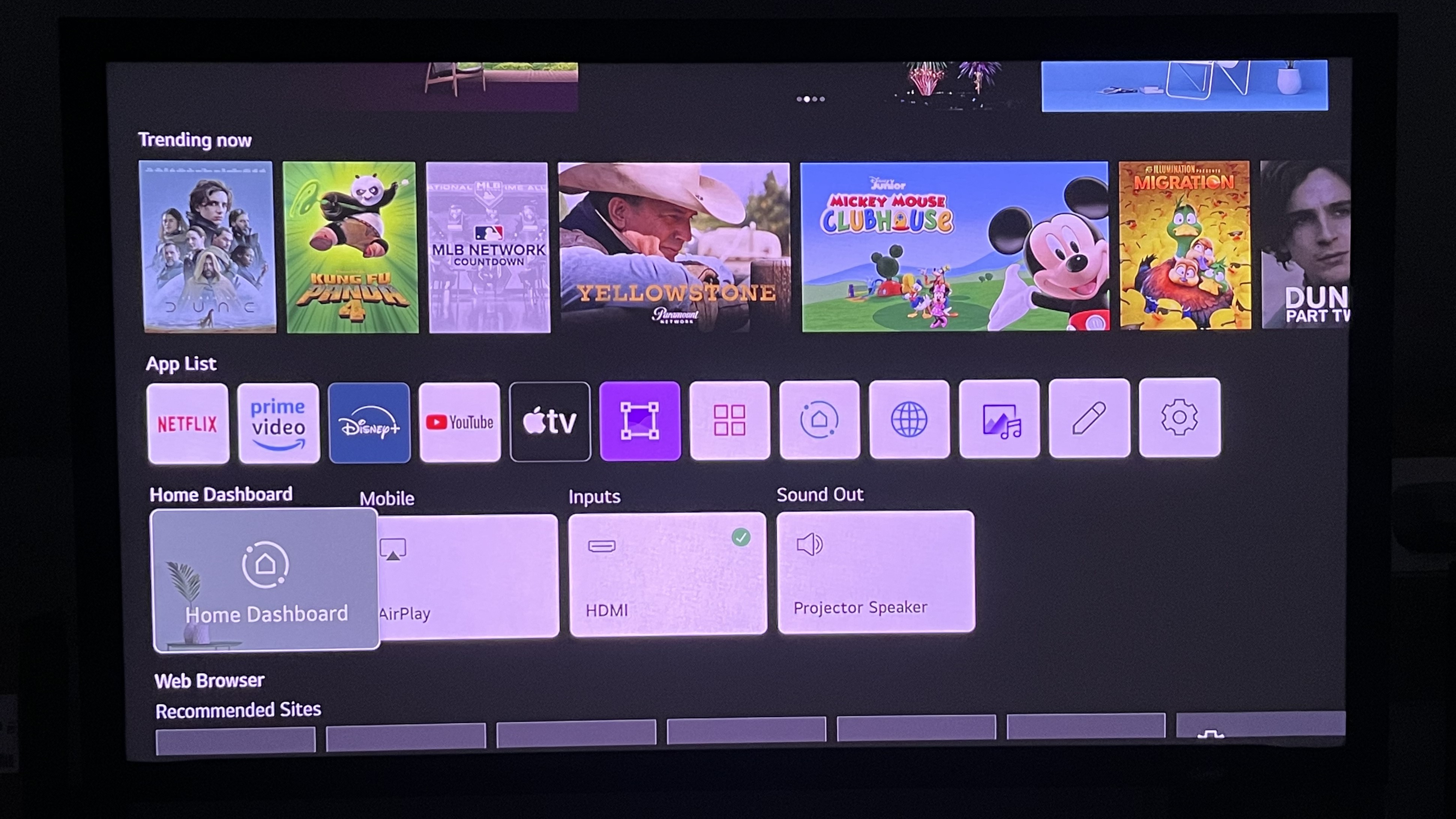
LG CineBeam Q 4K projector review: Price and availability
- Release date: April 2024
- MSRP: $1,299 / £1,299 / AU$2,499
LG’s CineBeam Q sells for $1,299 / £1,299 / AU$2,499, which is significantly higher than the Samsung The Freestyle 2nd Gen, another stylish portable projector.
The LG is a 4K resolution model, however, and that feature alone justifies its higher price bracket – most 4K projectors cost a lot more than this!
LG CineBeam Q 4K projector review: Specs
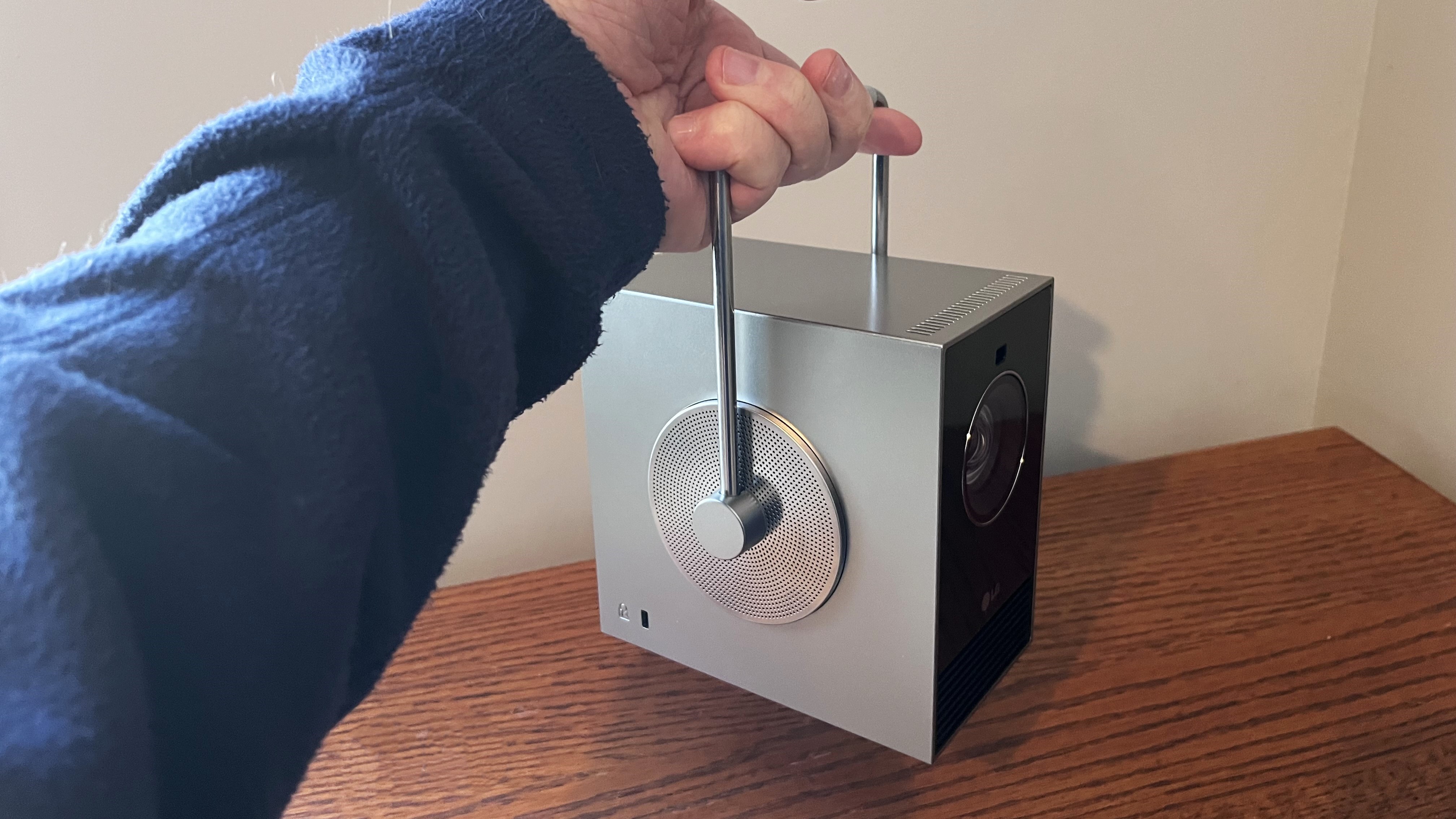
LG CineBeam Q 4K projector review: Design and features
- Stylish design and sturdy build quality
- RGB laser light engine
- LG WebOS streaming platform
The LG CineBeam Q is about as cool-looking as portable projectors get. LG appears to have designed it to be a conversation piece as much as a projector, with the LG CineBeam Q’s compact aluminum case and 360-degree rotating aluminum stand giving it an appealing, Braun-like industrial style.
At 5.3 x 3.1 x 5.3 inches (H x W x D) and 3.3 pounds, the LG CineBeam Q is easy to tote from room to room (the rotating stand does double-duty as a carrying handle), though with no built-in rechargeable battery (or accessory battery pack) you’ll need to carry its external power brick along with it to plug in. LG includes an IR remote control, though it’s a regular version and not the “Magic Remote” kind that comes with LG TVs where you can just point at what you want on-screen.
The LG CineBeam Q uses an RGB laser light engine combined with a DLP chip to produce images with up to 500 ANSI lumens specified brightness. An auto screen adjustment feature with autofocus can be used to make images look rectangular and crisp without effort when pointing it at a wall or screen, and there’s also manual digital keystone correction with 4, 9, or 15-point warping options.
LG’s WebOS platform is used for streaming on the CineBeam Q, with Disney Plus, Prime Video, Netflix, Apple TV Plus, and YouTube all present. Strangely, there’s no Hulu or Max, which are popular streaming apps that I use regularly. The projector supports both AirPlay 2 and Android Screen Share, however, which lets you stream from apps on your phone to the projector, or you can connect an external source to its HDMI or USB type-C input.
The LG CineBeam Q has a built-in 3-watt speaker, though it doesn’t sound good and can’t play loud. A better option is to use the Bluetooth pairing with Dual Audio Output feature, which lets you simultaneously connect up to two Bluetooth devices like a speaker, headphones, or soundbar.
- Design and features score: 4.5/5

LG CineBeam Q 4K projector review: Picture Quality
- Stylish design and sturdy build quality
- RGB laser light engine
- LG WebOS streaming platform
I went into this review with pretty low picture quality expectations for the LG CineBeam Q, and ended up pleasantly surprised by how good images looked. The main benefit the LG has over other ultra-compact portable projectors is 4K resolution with HDR10 and HLG high dynamic range support. That factor made a big difference in its picture, especially when watching movies, which is something I did on a 92-inch, 1.1 gain Stewart Filmscreen Cima matte white projection screen.
The LG CineBeam Q’s brightness was another surprise. Peak brightness measured on a white 10% window pattern was 60 nits in Filmmaker HDR Mode. Although that’s half the peak brightness you’d get from a more conventional home theater projector such as the BenQ v5000i, it’s very good for a portable model. The LG’s measured contrast ratio was 500:1, which is a typical result for a portable DLP projector.
Color performance was excellent, with the CineBeam Q’s grayscale and color Delta-E (the margin of error between the test pattern source and what’s shown on-screen) both averaging under our target level of 3 in Filmmaker Mode. Coverage of the UHDA-P3 colors gamut was also excellent at 98.7%, while BT.2020 coverage was an equally impressive 95%.
Input lag in Game Optimizer mode was 56ms, which is typical for projectors that aren’t specifically designed for gaming.
Watching reference 4K Blu-rays on the LG CineBeam Q, dark scenes in the James Bond film No Time to Die showed good contrast, and scenes with camera pans or fast motion looked solid and judder-free. Dark scenes in Dune were equally satisfying, though shadow detail wasn’t as good as what you can expect from the best larger 4K projectors. In both cases, the LG’s accurate color rendition made skin tones look completely natural, and brighter colors such as red, and orange, and yellow looked rich and clean.
- Picture quality score: 4.5 / 5
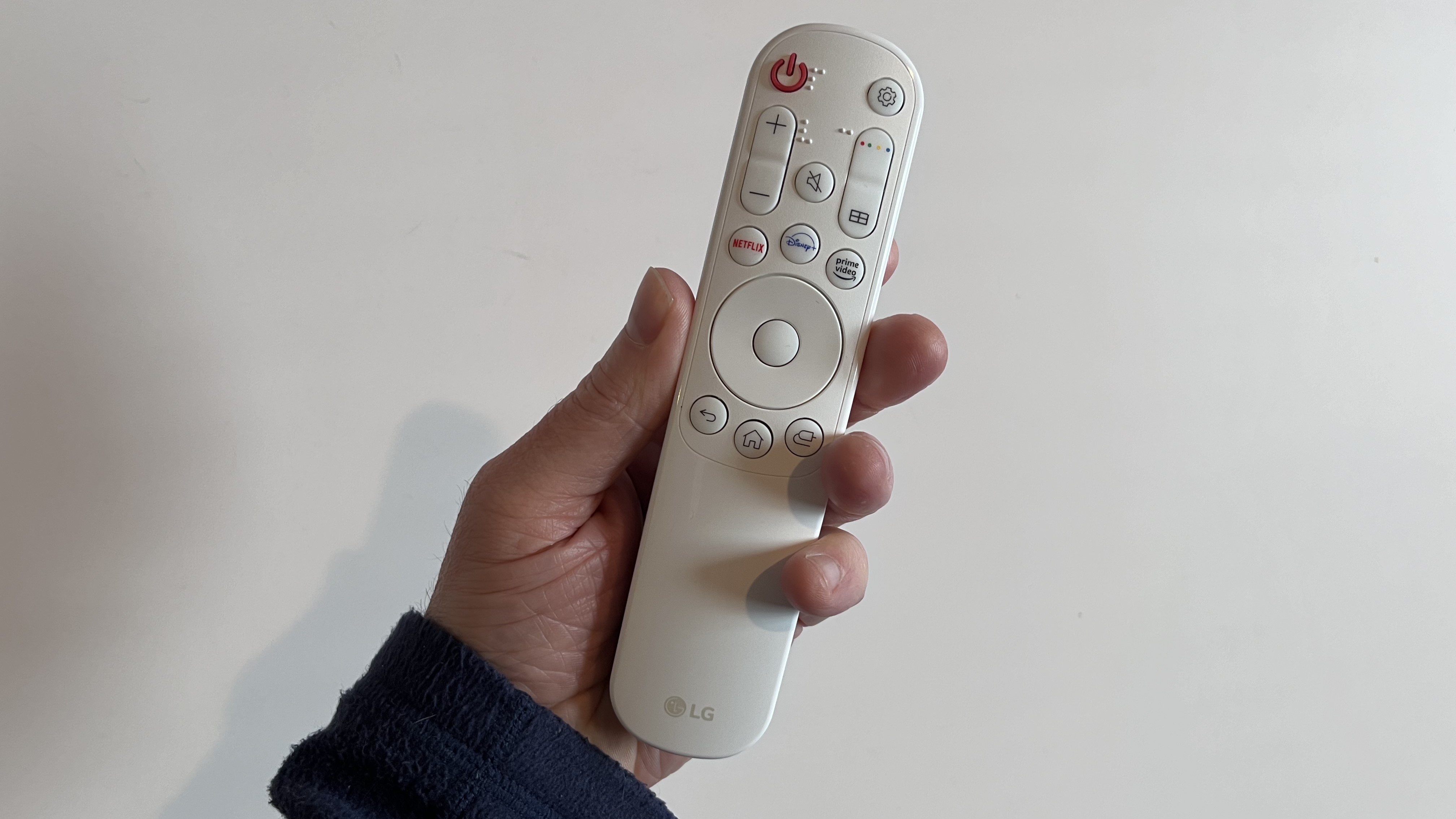
LG CineBeam Q 4K projector review: Value
- Less expensive than other 4K portables
- Better picture than other ultra-compact projectors
- Superior design for a portable projector
At $1,299 / £1,299 / AU$2,499, the LG CineBeam Q is pricier than regular HD portable projectors such as Samsung’s The Freestyle 2nd Gen, but less expensive than other 4K portables such as the Anker Nebula Cosmos Laser 4K. And while its overall picture quality is very good, brightness is limited, and there’s no battery power option for true portability.
The LG CineBeam Q scores value points for having an all-metal exterior as opposed to the cheap plastic casings used for most portable projectors. If you’re looking for a portable projector with a classy design that you can leave out in your living room when not in use, the LG is one of the few worth consideration. If that’s not the case, you can easily find cheaper models, though they’ll have a less attractive design and a less impressive picture.
- Value score: 4 / 5
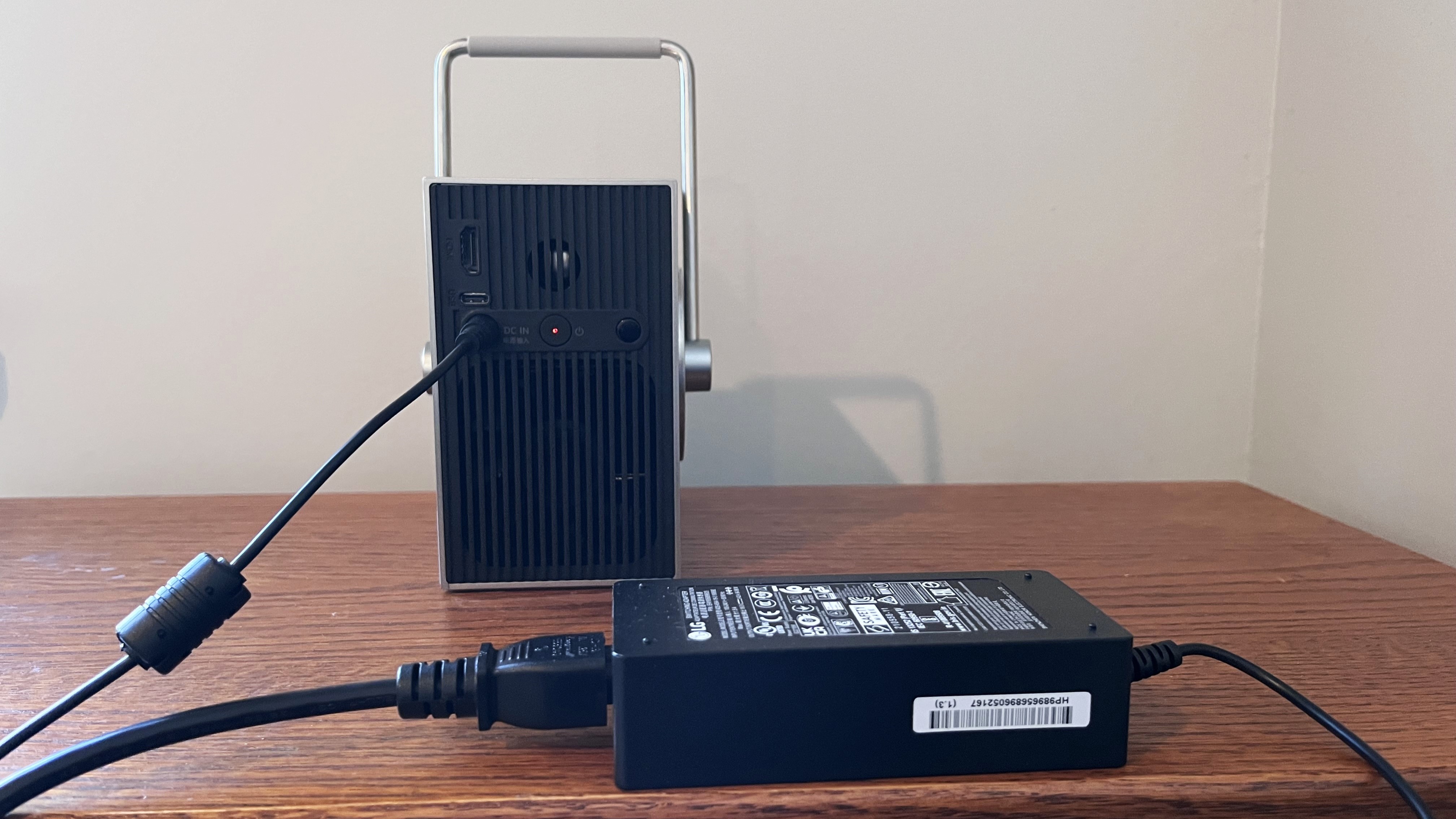
Should you buy the LG CineBeam Q 4K projector?
Buy it if...
Don’t buy it if…
Also consider...
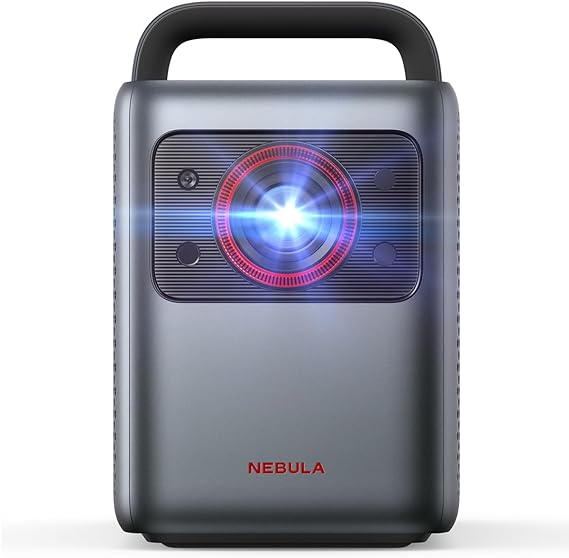
Anker Nebula Cosmos Laser 4K
This powerful portable has a laser-based light engine with a whopping 2,400 lumens brightness, though it costs significantly more than the LG. It also has an appealing design, though there’s no built-in battery for easy outdoor use. See our full Anker Nebula Cosmos Laser 4K review.
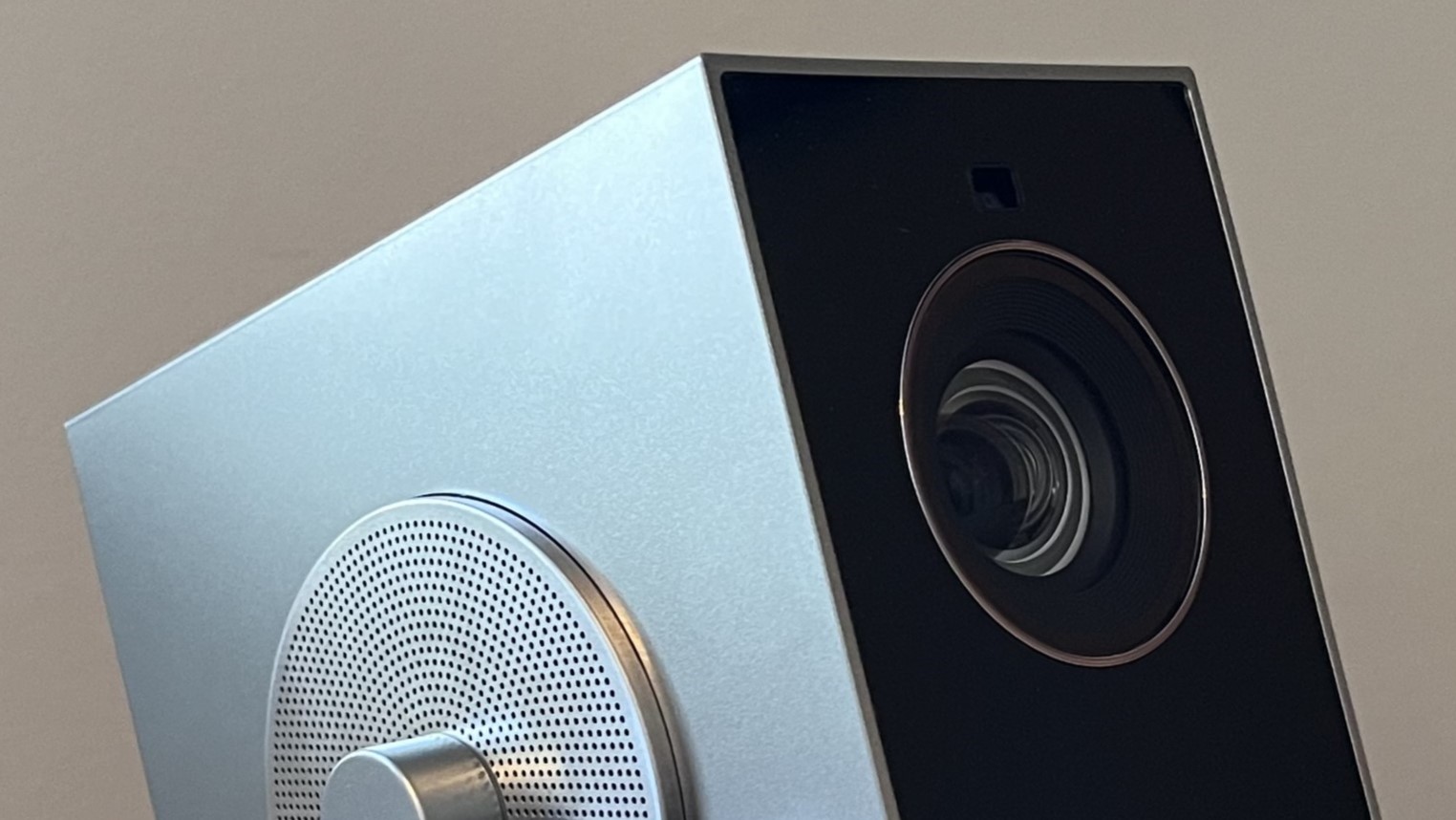
How I tested the LG CineBeam Q
- Tested at home, in a room with controlled light where I always test projectors
- Measurements were made using Calman color calibration software
- A 1.1 gain Stewart Filmscreen Cima matte white projection screen was used for evaluation and measurements
When I test projectors, my first step is to use it for casual viewing to assess the out-of-box picture presets. The next step is to select the most accurate-looking preset (typically labeled Filmmaker, Movie or Cinema) and measure the white balance (grayscale), gamma, and color point accuracy using Portrait Displays’ Calman color calibration software. The resulting measurements provide Delta-E values (the margin of error between the test pattern source and what’s shown on-screen) for each category, and allow for an assessment of the projector’s s overall accuracy.
Along with those tests, I make measurements of peak light output (recorded in nits) for both standard high-definition and 4K high dynamic range using a 10% white window pattern. Coverage of DCI-P3 and BT.2020 color space is also measured, with the results providing a sense of how faithfully the projector can render the extended color range in ultra high-definition sources. The final measurements are contrast ratio, which is the ratio of the brightest white to the darkest black that the projector can display, and input lag, which is measured using a Leo Bodnar 4K HDMI input lag tester.
The LG CinemaBeam provides a full range of adjustments to calibrate its picture, although its Filmmaker mode preset is accurate enough that most people will find it to be perfectly adequate. For my evaluation I calibrated the LG’s picture and relied on both reference 4K Blu-ray discs and streaming via AirPlay 2 to test its performance in the Filmmaker and Standard preset picture modes.
My projector testing experience spans almost three decades, going back to the early three-gun CRT models.
First reviewed: April, 2024
0 comments:
Post a Comment